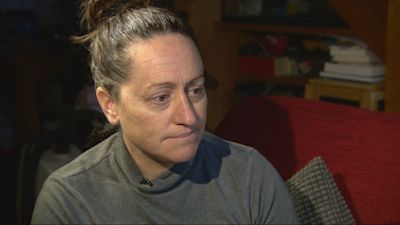'The world was ending': The Jersey women living with 'debilitating' PMDD with 'nowhere to turn'

ITV Channel reporter Verity Wishart has been uncovering how women with PMDD feel they have 'nowhere to turn'
Women in Jersey living with Premenstrual Dysphoric Disorder (PMDD) say they have "nowhere to turn" for support on the island.
Lawra Traylen experienced symptoms of PMDD for more than 40 years and now relies on medication to cope with everyday life.
She says: "I felt the world was ending, and I didn't want to be in it. I didn't see the point in being in it, I just didn't see the point in anything."
However, there are no specialists on the island fully qualified to deal with the condition.
What is PMDD?
PMDD is a very severe form of premenstrual syndrome (PMS), which causes a range of emotional and physical symptoms every month during the week or two before a period starts. Over one in ten women are thought to suffer from the debilitating condition.
Symptoms include:
Depression, irritability, or anxiety
Headaches, joint and muscle pain
Overeating and problems sleeping
Thoughts of hopelessness
Intense anger and conflict with other people
Tension, anxiety, and irritability
Panic attacks
Suicidal feelings
No interest in your usual activities
Trouble concentrating
Feeling out of control
Lawra adds: "I don't even think my family knows of that feeling of just not wanting to be here.
"It's massive and it's scary."
Politicians in Jersey say women's health needs to be prioritised at a government level.
Chair of Health and Social Security Panel, Deputy Louise Doublet says: "Historically women's health has been under-researched, under-resourced, understaffed and underfunded. This situation continues in Jersey.
"There are hundreds if not thousands of women who are suffering with conditions by virtue of being a woman.
"They are just not getting the treatment they need and deserve."
Echoing Deputy Doublet, Lawra says: "We aren't losing the plot; we aren't just being ridiculous women or being silly. There is actually a reason for it and it is serious.
"It is time we are being listened to properly."
Women's health GP at London Gynaecology, Dr Alisha Esmail says: "The fact that it covers a range of specialities, general practice, gynaecology, and psychiatry, it's all these specialities needing to work as one in an ideal world to try and treat this together."
She adds: "I think it is important to also advocate for yourself...I have had patients being thrown from door to door.
"There's a lot of mislabelling out there and trying to fit people into categories, unfortunately this is one of those things that doesn't fit in to a box."
Lawra says: "I am only able to talk about it because I don't want somebody else to wait 43 years to find out.
"I want this to help other young women."
Want a quick and expert briefing on the biggest news stories? Listen to our latest podcasts to find out What You Need To Know...